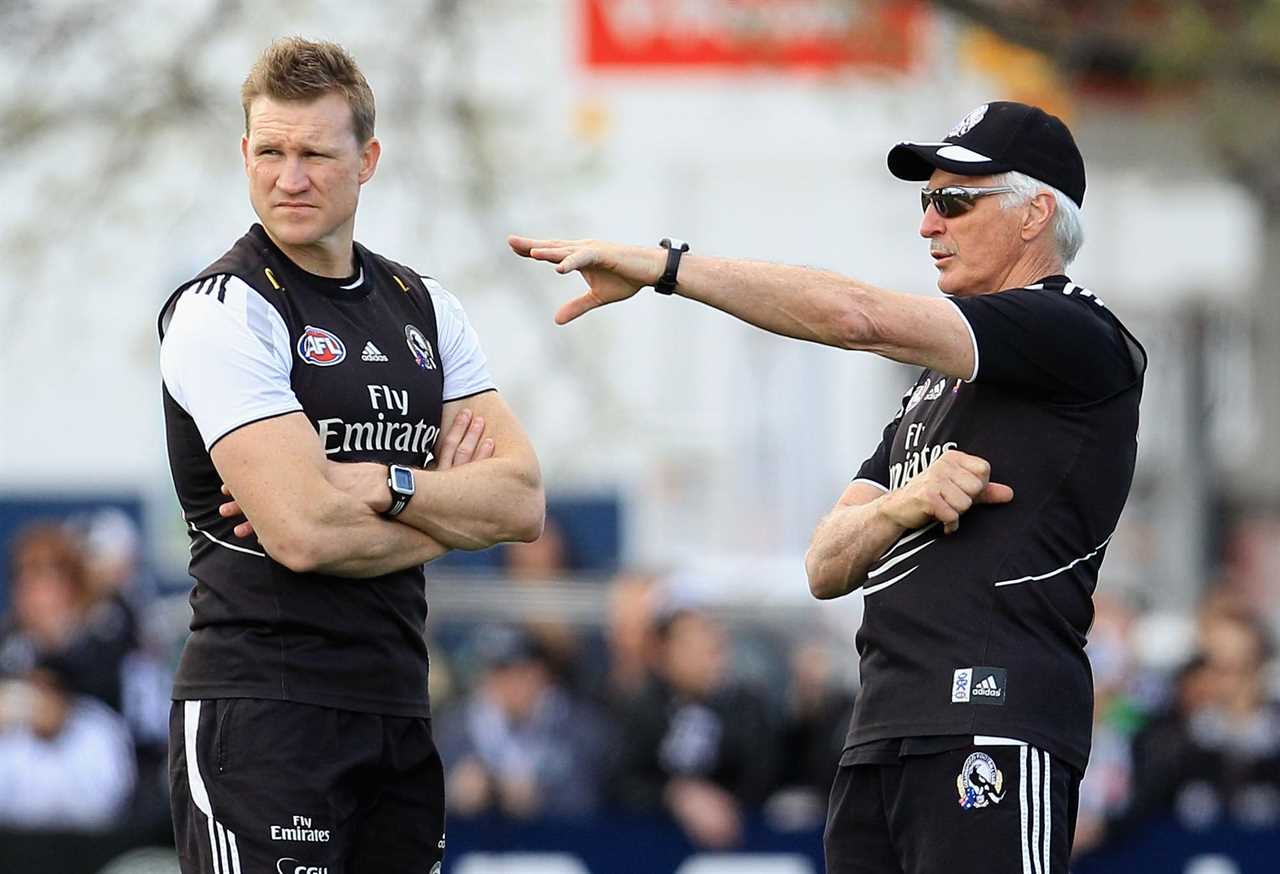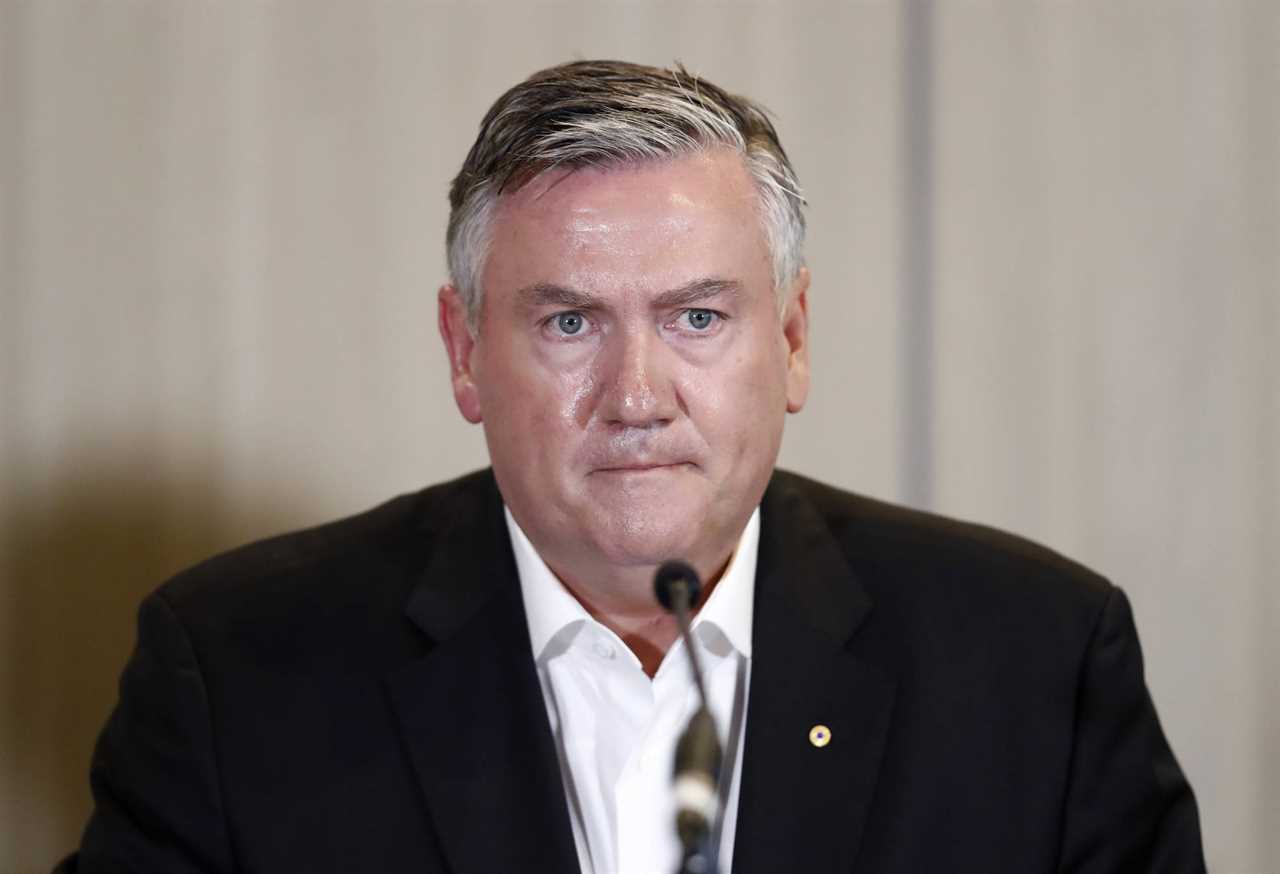I unwittingly caught part of Eddie McGuire and Jimmy Bartel’s podcast last week.
Fifteen minutes in, McGuire, yet again, went into defending Collingwood’s infamous succession plan – the deal that he spearheaded as club president in 2009, signing Nathan Buckley to a two-year apprenticeship under Mick Malthouse for 2010 and 2011, with Buckley taking over in his own right in 2012.
McGuire said Caroline Wilson always referred to it as ‘the disastrous succession plan’. He indignantly refuted that assertion, then qualified it as ‘the one that went preliminary final, premiership, grand final, preliminary final, and then onto grand final, preliminary final, final, one year [out of finals], preliminary final, and premiership’.
The level of misdirection here is astonishing. The level of delusion is something else.
McGuire will bluster and bully anybody who questions the succession plan, but if he’s going to throw this opinion out then it deserves a response.
He immediately ascribes 2009 to the succession plan – that’s the year Collingwood signed the contract, and a full year before Buckley joined the club in any official capacity. But, somehow, Collingwood’s preliminary final appearance gets listed on the succession plan’s CV.
Then comes Malthouse’s 2010 premiership triumph – the first year Buckley was an assistant coach. Now, obviously, it’s possible that Buckley contributed intel into the gameplan that helped the Pies evolve from contenders to premiers. But would it have happened had Buckley not been there?
After Geelong had smashed the Pies in the 2009 preliminary final, Malthouse knew he had to find a way to beat the Cats. That methodology was derived from the defence St. Kilda had applied so successfully to asphyxiate teams – the Saints were the least-scored-against team in 2009 by a collective 367 points.
Collingwood learned to do it better, and thus the press was born.

Nathan Buckley and Mick Malthouse (Photo by Hamish Blair/Getty Images)
I’ve heard fans argue that the succession plan put a rocket up Malthouse, who, apparently, was just using his senior coaching gig as a paycheque and superannuation plan.
This, of course, ignores Collingwood making the 2002 and 2003 grand finals, and finals from 2006-2009 – including preliminary finals in 2007 and 2009. Was Malthouse taking his job seriously here and then stopped? Or was the succession plan somehow, retrospectively, behind all these premiership assaults?
This whole assertion is spurious – so Malthouse decided to get serious about a flag tilt in the two years he had remaining in his tenure? Why? Was it going to save his job? Because it obviously didn’t, and he could’ve politicked for his retention.
His coaching pedigree to this point showed he was getting Collingwood in grand finals and finals.
Including 2010 and 2011 into the succession plan’s success is absurd, because the very name itself talks about what’s meant to happen next. Why else would you have a succession plan if it’s not about, well, succession?
McGuire reeled off all these years the Pies made finals but blatantly ignored 2014-2017 – four years they missed finals The last time that had happened at Collingwood was 1995-1999 – an era that ended ingloriously with a wooden spoon.
Prior to that, the last block of Collingwood missing the finals was 1940 – 1945, which shows you how unusual a prolonged absence from contention is.
Also, information has begun leaking out about that 2010-11 period. Buckley himself has spoken about relationships being broken. Malthouse and former players have talked about how they thought they were going to embark on a mini-dynasty. And why wouldn’t they believe that?
At the time of 2010, they were the youngest premiership team for 38 years. Look at the core of that side: Alan Didak 27, Dane Swan 26, Heath Shaw 25, Travis Cloke and Dale Thomas 23, Nathan Brown, Scott Pendlebury and Chris Dawes 22, Ben Reid 21, Steele Sidebottom 19 – just to name a few.
In his autobiography, Dane Swan poses that whoever succeeded Malthouse was always going to struggle because too many of the players were just too allied to him.

(Photo by Getty Images)
Swan said this wasn’t exclusively about Buckley – it would have happened with anybody. He also claims Malthouse defused talk of a petition to retain him.
So McGuire dismissed a premiership coach, fractured a successful environment, and handed the pieces to Buckley to somehow try to make whole.
Collingwood were listless in 2012-13 – symptomatic of the football they’d play the next four years. While they made a preliminary final in 2012, they never looked truly capable against either of the eventual grand finalists, Hawthorn, and Sydney. In 2013, Collingwood puttered into the finals, before losing to Port Adelaide at the MCG.
From the premiership team, Brown, Heritier Lumumba, Shaw, Sharrod Wellingham, Cloke, Dayne Beams, Dawes and Thomas would all be traded out – that’s over one-third of the flag 22, which tells you something in itself. Several other players retired acrimoniously.
This is not to have a shot at Buckley – it’s testament to what the environment must have been like where so many relationships were unworkable, and the extreme measures that were required to try and impose order.
Something else to factor in is Collingwood’s salary cap woes. It astonishes me that no one has examined exactly what was happening at the Pies at the time.
In the years following their 2018 grand final appearance, Collingwood traded out James Aish, Adam Treloar, Jaidyn Stephenson, and Tom Phillips, on top of retirements such as Ben Reid, Travis Varcoe, Beams and Matthew Scharenberg… and somehow still had a tight cap.
When Malthouse signed that contract early in 2009, it looked like a smart decision. He’d been there since 2000 and hadn’t been able to lead Collingwood to a flag.
From 2005-2009, all grand final coaches – Mark Williams, Paul Roos, John Worsfold, Mark Thompson, Alastair Clarkson, and Ross Lyon – were next generation. Malthouse’s contemporaries –Matthews and Kevin Sheedy – were gone. Change seemed necessary.
But once Malthouse brought Collingwood to the 2010 flag, that reasoning became unsound. Malthouse proved he not only still had relevance, but that he had become the best coach in the game with one of the best lists at his disposal – a list that had a strong spine, excellent midfield, class on every line, and wanted to play for him.
Given he had just brought Collingwood to their first flag since 1990, and led the team to successive grand finals, he had every right to feel he still had something to offer. Right now, Collingwood was working better than it ever had.
Circumstances change. Clubs adapt – or try to for the betterment of their future. Sticking with something that’s not working, or not going to work, is folly.
The succession plan might have been a good idea early in 2009, but by the time of Collingwood’s 2010 flag triumph, the wisdom behind it should have been re-evaluated. Given the circumstances, I’m sure all parties would’ve understood.
Had they postponed the succession plan, there is no guarantee it would have been successful. But as the old adage goes, if it’s not broken, don’t fix it.
McGuire not only tried to fix what wasn’t broken, but also broke what wasn’t broken.
Collingwood’s 2023 flag has nothing to do with the succession plan. In fact, the bloated salary cap has undoubtedly impacted the club’s ability to list-manage as they might like, so they should be commended for their Moneyball solutions.
It’s laughable that McGuire has roped this flag into his succession plan straw man to try manufacture validation.
Should any historian ever document Collingwood’s contemporary history, I have no doubt that the plan will ultimately be deemed the worst decision the club’s ever made.
It resulted in sacking of a relevant premiership coach, handed his successor an impossible situation to navigate, yanked apart a talented list playing brilliant football, engorged the salary cap, and resulted in one of the dreariest periods in Collingwood’s history which, inevitably, led to McGuire’s own demise as president.
Caroline Wilson is right. It was disastrous.
But I guess McGuire has to keep pushing the fairytale, because the reality is just too ugly.
https://www.theroar.com.au/2023/10/18/the-level-of-delusion-is-something-else-eddie-mcguires-defence-of-his-disastrous-coaching-succession-plan-is-ridiculous/
 Backyard GrillingWeekend WarriorsAdvice from DadBeard GroomingTV Shows for Guys4x4 Off-Road CarsMens FashionSports NewsAncient Archeology World NewsPrivacy PolicyTerms And Conditions
Backyard GrillingWeekend WarriorsAdvice from DadBeard GroomingTV Shows for Guys4x4 Off-Road CarsMens FashionSports NewsAncient Archeology World NewsPrivacy PolicyTerms And Conditions
